Every September, National Recovery Month offers a special time to focus on recovery from mental health and substance use disorders. Sponsored by the Substance Abuse and Mental Health Services Administration (SAMHSA), this month can inspire, educate, and celebrate the strength and resilience that defines the recovery journey.
If you’ve faced a mental health crisis—whether it was the depths of depression, the weight of suicidal thoughts, or another overwhelming challenge like addiction—National Recovery Month holds particular significance for you. It’s a chance to reflect on how far you’ve come, renew your commitment to your mental health, and explore new ways to support your ongoing recovery. But it’s also about more than just your journey—it’s about raising awareness and breaking down the barriers that still surround mental health issues.
Understanding the Importance of National Recovery Month
National Recovery Month is not just for those in recovery; it’s for everyone. It’s a time when conversations about mental health and substance use are brought to light. This acknowledges the struggles many face and celebrates the progress being made. National Recovery Month offers:
- Validation: You may have felt alone in your struggles, but when mental health issues are discussed openly in public forums, it’s a powerful reminder that your experiences are real, important, and deserving of care. Seeing these conversations unfold can provide a sense of validation that can be incredibly comforting and empowering.
- Reduced isolation: It’s easy to feel isolated when you’re battling a mental health crisis. But hearing stories of others who have faced similar challenges can help break that sense of isolation. You’re reminded that you’re not alone—many others are walking similar paths, and together, recovery becomes a shared experience rather than a solitary struggle.
- Education: Knowledge is power, especially when it comes to your mental health. The more you understand about what you’re going through, the better equipped you’ll be to advocate for yourself and make informed decisions.
- Hope and inspiration: Recovery is not always a linear path, and there will be days when progress feels out of reach. During National Recovery Month, stories of success and resilience are shared widely, offering hope when you need it most. These stories can serve as a reminder that recovery is possible, even on the most challenging days.
- Family and community support: As awareness grows, so does understanding. When your family and community become more educated about mental health, they’re better prepared to offer the support you need. This can lead to stronger relationships and a more supportive environment, making your recovery journey a little bit easier.
Engaging with National Recovery Month
National Recovery Month isn’t just about raising awareness; it’s also about active participation. There are several ways you can engage with this important month to support your own recovery and help others along the way:
- Share your story: If you feel comfortable, consider sharing your experiences with trusted friends, family, or support groups. Your journey could provide hope and insight to others who are facing similar challenges. Even if you’re not ready to share publicly, just talking to someone close to you can be incredibly liberating.
- Attend events: Look for local or virtual events related to National Recovery Month. These could include support group meetings, educational seminars, or community gatherings. Participating in these events can help you feel connected to a larger community of people who understand what you’re going through.
- Educate yourself: Knowledge is one of your best allies in recovery. Take advantage of the resources provided by SAMHSA and other reputable mental health organizations. The more you learn, the better equipped you’ll be to handle challenges and make informed decisions about your care.
- Practice self-care: This month reminds you to prioritize your mental health. Reflect on your progress, set new goals, and engage in activities that support your well-being. Whether it’s meditation, exercise, or simply taking time to rest, self-care is a vital part of recovery.
- Reach out: If you’re struggling, use the increased awareness surrounding National Recovery Month as motivation to reach out for help. Whether it’s contacting a mental health professional, calling a helpline, or talking to a trusted friend, remember that seeking support is a sign of strength, not weakness.
At Peak Behavioral Health in Santa Teresa, New Mexico, we understand the importance of personalized, compassionate care in the recovery process. National Recovery Month reminds you that you’re not alone on this journey. If you’re ready to take the next step, please contact us today to learn about our programs and services and how we can put you on the path to better mental health.







